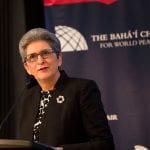This has been a sorrowful moment. Racial unrest. Economic dislocation. The ravages of Covid-19. There has been death, and there will be more. All of us have somehow been shaped by this ‘Year of Covid’. Even those not directly touched – that is to say, from a personal encounter of the disease or by a loved one’s personal encounter – have seen fundamental changes in our way of life. We all bear witness to the sorrow that comes as we witness the end of an age, the closing of a well-known world. We have missed new opportunities, new chances of recognition and acceptance. We have all lost something, whether big or small. All should craft a small space to grieve, to process, and to consider.
In April 2020, the Baha’i Chair for World Peace at the University of Maryland invited [insert link here to the letter of invitation] scholars, practitioners, researchers and students to contribute a reflection piece for a series titled “Learning During the COVID-19 Pandemic.” The reflections, were posted every Monday on the Bahá’í Chair’s blog.
The intention of the series was to broaden our understanding and knowledge, which in turn makes action more possible. The blog posts explored the effects of the pandemic on our lives, the economy, the environment, the media, and so many other aspects of our lives. Some of the themes in the series included how the health crisis has revealed inequalities in society and has exposed deficiencies in effective coordination and collaboration among institutions and governments.
As the series comes to a close, we want to take this opportunity to thank all of the contributors whose reflections have deepened our knowledge about the different landscapes and features of the pandemic. These features have included the impact of capitalism and consumerism on the urban disconnection between people; digital inequality; “screen time” and children’s use of media; the challenge of confronting the “epidemic of dehumanization;” the public health implications of wealth disparity; systemic racism’s impact on health disparities; and many other insights and perspectives. We hope you will take the time, if you have not already done so, to read this rich collection of reflections.
As we begin a new academic year at the University of Maryland, we also would like to take the opportunity to wish everyone (both in person and virtually) a successful start to a new academic year. It is our hope that the campus community stays safe and healthy.
Eventually, we will find a cure for the coronavirus. But the cure for racism, inequality, religious strife, and so many other problems, will require a deeper consideration and application of knowledge and ideals if we wish to shape a better society for all people. Our world’s complexities call out for a comprehensive, interdisciplinary approach to finding answers. The scientific basis of knowledge is critical if we are to probe ever-deeper into understanding human nature; and an acceptance of and sensitivity to our deepest humanity is needed for a more equitable distribution of the world’s bounty.
About the Author:

Professor Hoda Mahmoudi holds the Bahá’í Chair for World Peace at the University of Maryland. Dr. Mahmoudi develops a sound scientific basis for knowledge and strategies that explore the role of social actors and structures in removing obstacles to peace and creating paths to a better world. For more information about Hoda: Bahá’í Chair for World Peace website.
